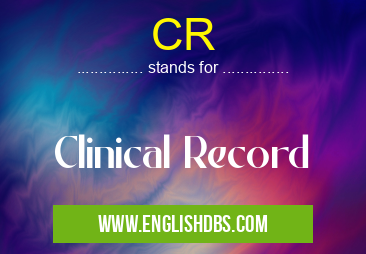What does CR mean in CLINICAL MEDICINE
CR stands for Clinical Record. A Clinical Record is a comprehensive record of a patient's health and medical care over time. It includes information such as diagnoses, treatments and results of laboratory tests, as well as notes taken by healthcare providers documenting the patient's progress and opinions on treatment options.

CR meaning in Clinical Medicine in Medical
CR mostly used in an acronym Clinical Medicine in Category Medical that means Clinical Record
Shorthand: CR,
Full Form: Clinical Record
For more information of "Clinical Record", see the section below.
Essential Questions and Answers on Clinical Record in "MEDICAL»CLINICAL"
What is included in a Clinical Record?
A Clinical Record includes information such as diagnoses, treatments and results of laboratory tests, as well as notes taken by healthcare providers documenting the patient's progress and opinions on treatment options.
Who has access to the Clinical Record?
Access to a patient's Clinical Record is typically restricted to authorized healthcare providers who are part of the patient's treatment team. The patient may also have access to view their own record with their doctor or hospital.
How long are Clinical Records maintained?
The retention period for Clinical Records depends on local regulations and varies from one institution to another; however, most maintain them for at least seven years after the last entry in the record.
Are there any legal requirements for maintaining a Clinical Record?
Yes, there are legal requirements concerning the security and confidentiality of medical records, including those related to accuracy, completeness, quality control, and timely release of records when requested. Healthcare organizations must comply with all applicable laws regarding privacy, security and information sharing in order to protect the patient's rights.
Is there an electronic version of a Clinical Record?
Yes, many hospitals and medical practices have moved away from paper records in favor of digital health records (EHRs) which are much more convenient than paper files due to their improved efficiency and reduced risk of errors associated with manual data entry.
Final Words:
To ensure accurate diagnosis and effective treatment planning it is important that healthcare professionals keep accurate and up-to-date records of patients' history, conditions and treatments. This is why clinical records are so important in modern medicine — they provide physicians with essential data that can be used to make informed decisions about care plans.
CR also stands for: |
|
| All stands for CR |
